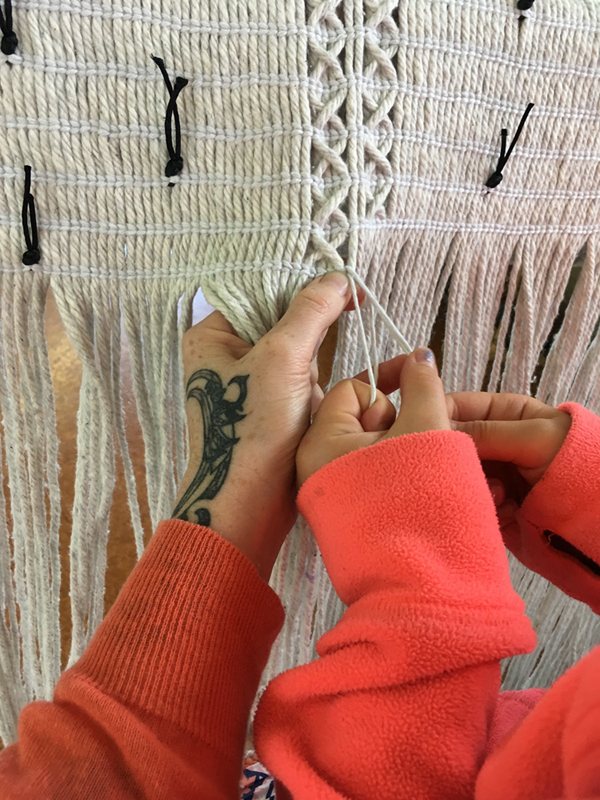Storymaking Belonging
DOI:
https://doi.org/10.18432/ari29429Palabras clave:
Indigenous women, White women, storying, belonging, ancestry, place, making, stitchingResumen
Sometimes data invites more of us. To be physically held and touched, through hands creating and crafting with matter, cultivating a closer connection to the fibres, threads, textures and sinews of data. Through touching and shaping the materiality of data, other beings, places and times are aroused. Here, we share the story of data that invited more of us and how this has spurred the creation of an exhibition titled Stories of Belonging with Indigenous and non-Indigenous artist/scholars for an arts festival in Queensland, Australia. This work by the collective, SISTAS Holding Space, deeply interrogates our ontological positionality as researchers, in particular what this means in the Australian context – a colonised nation populated through waves of migration. The scars of colonization, migration and shame are held and heard through Black and White Australian women creating and interrogating belonging alongside each other – listening and holding space for each other. We air the pains of ontological destruction, silencing, disconnection and emptiness. Through experimental making research methodology, we argue the primacy of storying and making, and for provoking resonant and entangled understandings of belonging and displacement.Citas
Agosín, M. (1996). Tapestries of hope, threads of love: The arpillera movement in Chile 1974-1994. Albuquerque, NM: University of New Mexico Press.
Barad, K. (2014). On touching —The unhuman that therfore I am (v1.1). In S. Witzgall & K. Stakemeier (Eds.), Power of material/politics of materiality (pp. 153-164). Berlin: Diaphanes.
Cutcher, A. J. (2015). Displacement, identity and belonging: An auto/biographical and arts-based portrayal of ethnicity & experience. Rotterdam, NL: Sense Publishers.
Deleuze, G. (1990). The logic of sense. [C. Boundas, Trans]. New York: Columbia University Press.
Grosz, E. (2008). Chaos, territory, art: Deleuze and the framing of the Earth. New York: Columbia University Press.
Guardado, M. (2002). Loss and maintenance of first language skills: Case studies of Hispanic families in Vancouver. Canadian Modern Language Review, 58(3), 341-363.
Hatoss, A. (2004). Multiculturalism and mother tongue maintenance–the case of the Hungarian diaspora in Queensland. Australian Review of Applied Linguistics, 27(2), 18-3.
Heckenberg, I. (2018, May 18/20). River music: Yindyamarra milawa bila. Commissioned for performance Yindyamarra Bila Yiramal Ngurambang Milawa Wirramarri, Maranggaal in “Stories of Belonging,” Brisbane, AU.
Heckenberg, R. (2016). Learning in place, cultural mapping and sustainable values on the Millawa Billa (Murray River). The Australian Journal of Indigenous Education,45(1), 1-10. doi:10.1017/jie.2015.23
hooks, b. (1995). Writing autobiography. In M. Blair, J. Holland, & S, Sheldon (Eds.), Identity and diversity: Gender and the experience of education (pp. 3-7). Clevedon, UK: Multilingual Matters.
Joannidis, C. (2013). Homecoming. International Forum of Psychoanalysis 22(3), 133-141.
Lasczik Cutcher, A. (2018). Moving-with & moving-through homelands, languages
& memory: An arts-based walkography. Rotterdam, NL: Brill Sense Publishers.
Libraries Tasmania Online Collection. (n.d.). Hope Surgeon’s journal. Retrieved from
https://stors.tas.gov.au/CON19-1-3$init=CON19-1-3p135
MacLure, M. (2013). The wonder of data. Cultural Studies/Critical Methodologies, 13(4), 228-232.
McGahey, T. & Lasczik Cutcher, A. (2015). Gypsy [Recorded by T. McGahey]. On Cloud 9 [CD Album]. Nashville, TN: Tahlia McGahey Productions.
Nicolacopoulos, T., & Vassilacopoulos, G. (2014). Indigenous sovereignty and the being of the occupier: Manifesto for a white Australian philosophy of origins. Melbourne, AU: Re.Press.
Pink, S (2015). Doing sensory ethnography (2nded). Thousand Oaks, CA: Sage.
Richardson, L. (1999). Feathers in our cap. Journal of Contemporary Ethnography, 28(6), 660-668. doi:10.1177/089124199129023767
Snowber, C., & Bickel, B. (2015). Companions with mystery: Arts, spirit, and the ecstatic. In C. Leggo, S. Walsh, & B. Bickel (Eds.), Arts-based and contemplative practices in research and teaching: Honouring presence (pp. 67-87). New York, NY: Routledge.
Walsh, S., & Bai, H. (2015). Writing witness consciousness. In C. Leggo, S. Walsh, & B. Bickel (Eds.), Arts-based and contemplative practices in research and teaching: Honouring presence (pp. 24-44). New York, NY: Routledge.
Descargas
Publicado
Cómo citar
Número
Sección
Licencia
Derechos de autor 2019 Art/Research International: A Transdisciplinary Journal

Esta obra está bajo una licencia internacional Creative Commons Atribución-NoComercial-SinDerivadas 4.0.
Authors who publish with Art/Research International agree to the following terms:
a. Authors retain copyright and grant the journal right of first publication and the right to sublicense the Contribution, in the form in which it is published by the journal, to others under the terms and conditions of the of the Creative Commons Attribution-NonCommercial-NoDerivs (CC BY-NC-ND) that allows others to download the work and share the work with others with an acknowledgement of the work's authorship and initial publication in this journal, but they cannot change the work in any way or use any part of the work commercially.
b. Authors are able to enter into separate, additional contractual arrangements for the non-exclusive public distribution and display of the journal's published version of the work (e.g., post it to an institutional repository or publish it in a book), with an acknowledgement of its initial publication in this journal.
c. Authors are permitted and encouraged to post their work online (e.g., in institutional repositories or on their website) prior to and during the submission process, as it can lead to productive exchanges, as well as earlier and greater citation of published work (See The Effect of Open Access).
d. Authors wishing to include items (such as images or other media, or any creative works of others whether previously published or not) must contact the original copyright holder to obtain explicit permission to publish these items in Art/Research International. Writing permission should include: the title(s) of any copyrighted work, original place of publication if applicable, and an acknowledgement of having read Art/Research International's copyright notice. Authors are responsible for obtaining this permission and keeping it in their own records for later verification.



